高一必修四重点难点情态动词havedone
情态动词+havedone的用法小结
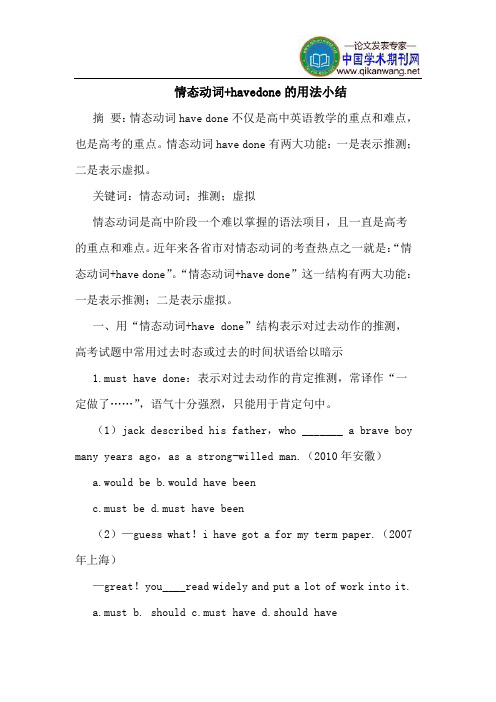
情态动词+havedone的用法小结摘要:情态动词have done不仅是高中英语教学的重点和难点,也是高考的重点。
情态动词have done有两大功能:一是表示推测;二是表示虚拟。
关键词:情态动词;推测;虚拟情态动词是高中阶段一个难以掌握的语法项目,且一直是高考的重点和难点。
近年来各省市对情态动词的考查热点之一就是:“情态动词+have done”。
“情态动词+have done”这一结构有两大功能:一是表示推测;二是表示虚拟。
一、用“情态动词+have done”结构表示对过去动作的推测,高考试题中常用过去时态或过去的时间状语给以暗示1.must have done:表示对过去动作的肯定推测,常译作“一定做了……”,语气十分强烈,只能用于肯定句中。
(1)jack described his father,who _______ a brave boy many years ago,as a strong-willed man.(2010年安徽)a.would beb.would have beenc.must bed.must have been(2)—guess what!i have got a for my term paper.(2007年上海)—great!you____read widely and put a lot of work into it.a.mustb. shouldc.must haved.should havekeys:d;c(注意:must have done只能表推测)2.may/might have done表示对过去的可能性推测“过去可能做了某事”,其程度小于must have done,一般也用于肯定句。
如:—i left my handbag on the train,but luckily someone gave it to the railway officials.—how unbelievable to get it back!i mean,someone _______ it.(2011年江苏)a.will have stolenb.might have stolenc.should have stolend.must have stolenkeys:b3.can/could (not)have done意思是“过去(不)可能做过某事”,常用于否定句和疑问句。
情态动词 have done难点突破 (2)
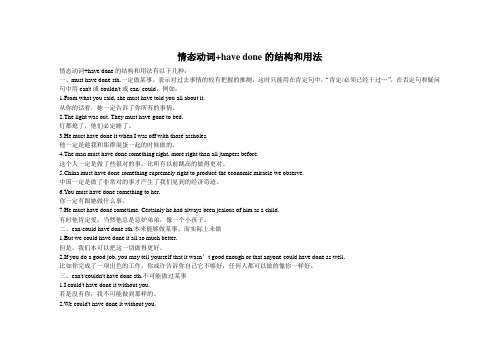
情态动词+have done的结构和用法情态动词+have done的结构和用法有以下几种:一、must have done sth.一定做某事。
表示对过去事情的较有把握的推测,这时只能用在肯定句中,“肯定/必须已经干过…”,在否定句和疑问句中用can't或couldn't或can/ could,例如:1.From what you said, she must have told you all about it.从你的话看,她一定告诉了你所有的事情。
2.The light was out. They must have gone to bed.灯都熄了,他们必定睡了。
3.He must have done it when I was off with those assholes.他一定是趁我和那群混蛋一起的时候做的。
4.The man must have done something right, more right than all jumpers before.这个人一定是做了些很对的事,比所有以前跳高的做得更对。
5.China must have done something supremely right to produce the economic miracle we observe.中国一定是做了非常对的事才产生了我们见到的经济奇迹。
6.You must have done something to her.你一定有跟她做什么事。
7.He must have done sometime. Certainly he had always been jealous of him as a child.有时他肯定爱,当然他总是忌妒弟弟,像一个小孩子。
二、can/could have done sth.本来能够做某事,而实际上未做1.But we could have done it all so much better.但是,我们本可以把这一切做得更好。
情态动词have_done

情态动词+have+done是历年高考的重点和难点之一,现将其用法总结归纳如下:一、must+have+done表示对过去事情的肯定推测,译成“一定做过某事”,该结构只用于肯定句.1. It must have rained last night, for the ground is wet. 昨晚一定下雨了,因为地面还是湿的2. You must have been mad to speak to the servant.你和仆人说话,一定是发疯了二、“can't+have+done”表示对过去事情的否定推测,译成“不可能做过某事”。
1. Mr. Smith can't have gone to Beijing, for I saw him in the library just now. 史密斯先生不可能去北京了,我刚才还在图书馆见过他。
2.Mary can't have stolen your money. She has gone home.玛丽不可能偷你的钱,她回家去了三、“can+have+done”表示对过去行为的怀疑,用于疑问句,译成“可能做过……吗?”。
1.There is no light in the room. Can they have gone out?屋里没有灯,他们可能出去了吗?2. There is nowhere to find them. Where can they have gone? 到处找不到他们,他们可能到什么地方去呢?四、could+have+done’是虚拟语气,表示对过去事情的假设,意思是本来能够做某事而没有做.He could have passed the exam, but he was too careless.本来他能通过考试,但他太粗心五、“may+have+done”表示对发生过的事情的推测,意思是“可能已经”或“也许已经”,用于肯定句中。
“情态动词+have_done”重点讲解

1. Sorry, I’m late. I ____ have turned off the alarm clock and gone back to sleep again.( 2000春) A. might C. can B. should D. will
根据They were already five people in the car, but they managed to take me as well.一句中的时态,应该是对过去情况的推测 判断,因为车上已经有5位人了,在带上我一个,可以断定 这一定是一次不舒适的旅行。所以,本句表达的是对过去 否定的推测判断,应该用can’t/ could have done来表达。故 答案选D。
--- Catherine, I have cleaned the room for you. --- Thanks. you ___ it. I could manage it myself. ( 05福建 31题) A. needn’t do C. mustn’t do B. needn’t have done D. shouldn’t have done
2. My sister met him at the Grand Theatre yesterday, so he ____ your lecture. (2002 上海) A. couldn’t have attended B. needn’t have attended C. mustn’t have attended D. shouldn’t have attended
最新情态动词+have-done总结
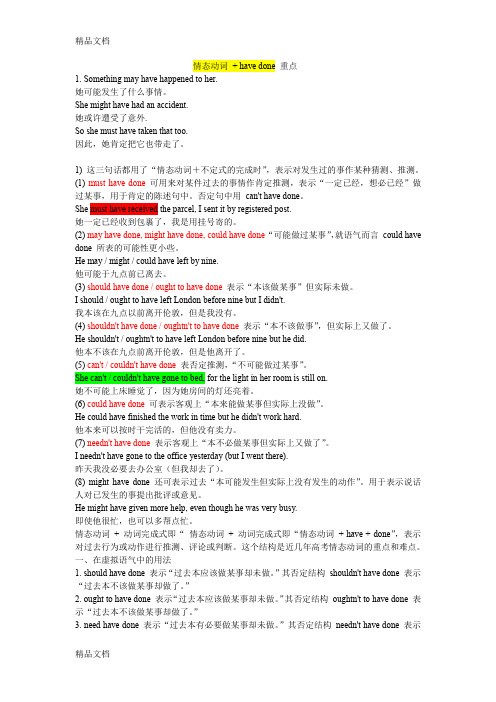
情态动词+ have done 重点1. Something may have happened to her.她可能发生了什么事情。
She might have had an accident.她或许遭受了意外.So she must have taken that too.因此,她肯定把它也带走了。
1) 这三句话都用了“情态动词+不定式的完成时”,表示对发生过的事作某种猜测、推测。
(1) must have done 可用来对某件过去的事情作肯定推测,表示“一定已经,想必已经”做过某事,用于肯定的陈述句中。
否定句中用can't have done。
She must have received the parcel, I sent it by registered post.她一定已经收到包裹了,我是用挂号寄的。
(2) may have done, might have done, could have done “可能做过某事”,就语气而言could have done 所表的可能性更小些。
He may / might / could have left by nine.他可能于九点前已离去。
(3) should have done / ought to have done表示“本该做某事”但实际未做。
I should / ought to have left London before nine but I didn't.我本该在九点以前离开伦敦,但是我没有。
(4) shouldn't have done / oughtn't to have done 表示“本不该做事”,但实际上又做了。
He shouldn't / oughtn't to have left London before nine but he did.他本不该在九点前离开伦敦,但是他离开了。
高考“情态动词+have_done”考点解析
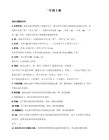
2、根据句意“我妹妹昨天在大剧院见过他”,所以,一定是对过去已经发生的否定的判断,答案选A。
3、本句表达的是对过去发生过的情况的疑问,所以应该用could have done,答案选C。
It must have rained last night, for the ground is wet this morning.
昨天晚上一定是下雨了,因为今晨地面是潮湿的。
She didn’t attend the lesson yesterday. She must have been ill.
A. should B. must C. could D. would
4. I didn’t see her in the meeting-room this morning. She ____ at the meeting. (1995 上海)
A. mustn’t have spoken B. shouldn’t have spoken
A. might B. should C. can D. will
2. The window was broken. Tom ____ have done that, for he was a little naughty.
A. could B. might C. should D. ought to
--- It ___ a comfortable journey. (MET95)
A. can’t be B. shouldn’t be C. mustn’t have been D. couldn’t have been
2. My sister met him at the Grand Theatre yesterday, so he ____ your lecture. (2002 上海)
情态动词+have done用法讲解
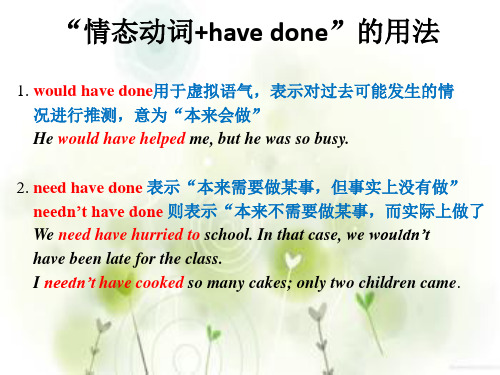
1. would have done用于虚拟语气,表示对过去可能发生的情 况进行推测,意为“本来会做” He would have helped me, but he was so busy. 2. need have done 表示“本来需要做某事,但事实上没有做” needn’t have done 则表示“本来不需要做某事,而实际上做了 We need have hurried to school. In that case, we wouldn’t have been late for the class. I needn’t have cooked so many cakes; only two children came.
3. should have done 表示“本来应该做某事,二十几上没有做” shouldn’t have done 则表示“本来不应该做某事,而实际上做 了”,含有职责对法或自责之意。 The essay should have been finished last week, but I forgot it. Tom is crying ; I shouldn’t have been so harsh on him. 4. might have done 表示使对过去情况把握性不大的推测,意为 “可能坐过…”或表示说话人因某人没做某事而不满,意为 “本应该做…” He might have won the race, if you had been backing him. 5. must have done 表示对过去情况的肯定推测,意为“一定做过 某事”,该结构只用于肯定句 It must have rained last night, for the ground is wet.
“情态动词have-done”重点讲解

03
have-done的句型结构
have done句型
表示现在完成时,强调动作已经完成 但对现在有影响。
时态:现在时间点之前完成的动作。
用法:have done + 过去分词,例如: I have finished my homework.
had done句型
表示过去完成时,强调动作在过 去的某个时间之前已经完成。
定义
表示过去的某个时间点,某个动作已经完成或发生 的动作。
表示过去的某个时间点,某个动作已经完成或发生 的动作,并且强调这个动作对现在的影响。
表示过去的某个时间点,某个动作已经完成或发生 ,并且强调这个动作对未来的影响。
用法分类
02
01
03
表示过去的某个时间点,某个动作已经完成或发生, 并且强调这个动作对现在的影响。
3. I _____ (see) the film twice, so I don't want to see it again. (用适当的形式填空)
答案:have been working 答案:has finished 答案:have seen
翻译题练习
1. 我已经完成了我的论文,现
在可以放松一下了。
时态:将来时间点之前完成的动作。
04
have-done的语境与语义
表示经验
用于描述个人或团体过去所经历的事件或状态,强调经验或经历 。
例如:I have been to the Great Wall before. (我之前去过长城 。)
表示结果
01
强调某个动作或行为所产生的结 果或影响。
02
A. has taken B. has lifted C. has been taking D. has been lifting
浅析高考试题中情态动词+have done重难点及用法

- 161 -校园英语 / 基础教育浅析高考试题中情态动词+have done重难点及用法陇南市武都区钟楼小学/杜全福【摘要】“情态动词+have done”是情态动词语法项目中一个十分重要的语言点,是高考的重点,也是近年来各省市高考英语试题考查的热点内容。
情态动词have done有两大功能:一是表示推测;二是表示虚拟。
【关键词】情态动词 用法 高考题 虚拟语气 高考英语情态动词是高中阶段一个难以掌握的语法项目,且一直是高考的重点和难点。
下面笔者结合近年来高考英语试题谈谈“情态动词+have done ”的几种常见但却容易混淆的用法:一、must+ have+过去分词:表示对过去发生动作或存在的状态进行推测。
只用于肯定的陈述句中(在否定句及疑问句中用can)意思是“一定、已经”。
e.g: If he had already been there, I must have been seen him.Her watch must have stopped .I will go and call her. 【高考链接】Jack described his father, who ___ a brave boy many years ago, as a strong-willed man.A. would beB. would have beenC. must beD. must have been (2010安徽卷,32)【答案】 D 【简析】此题考查情态动词must 表示推测的用法,推测过去用must +have done 的结构,正确答案为选项D 。
二、may\might + have +过去分词:表示对过去发生动作或存在的状态进行不肯定的推测。
可用于肯定句(意思是“可能已经”、也许)和否定句(意思是“可能没有”);might 的语气没有may 那么肯定。
might + have +过去分词:还可表示“本来可能......”,但实际上没有发生的事;另外,还可表示“本来应该或可以做某事”之意,含有轻微的责备语气。
情态动词+have done
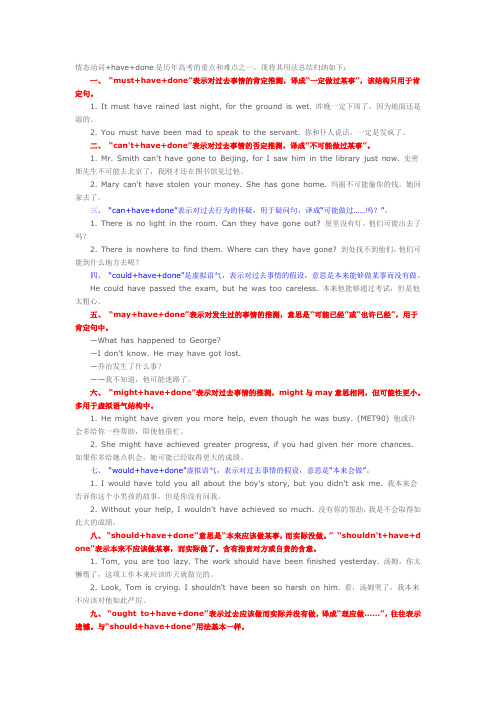
情态动词+have+done是历年高考的重点和难点之一,现将其用法总结归纳如下:一、“must+have+done”表示对过去事情的肯定推测,译成“一定做过某事”,该结构只用于肯定句。
1. It must have rained last night, for the ground is wet. 昨晚一定下雨了,因为地面还是湿的。
2. You must have been mad to speak to the servant. 你和仆人说话,一定是发疯了。
二、“can't+have+done”表示对过去事情的否定推测,译成“不可能做过某事”。
1. Mr. Smith can't have gone to Beijing, for I saw him in the library just now. 史密斯先生不可能去北京了,我刚才还在图书馆见过他。
2. Mary can't have stolen your money. She has gone home. 玛丽不可能偷你的钱,她回家去了。
三、“can+have+done”表示对过去行为的怀疑,用于疑问句,译成“可能做过……吗?”。
1. There is no light in the room. Can they have gone out? 屋里没有灯,他们可能出去了吗?2. There is nowhere to find them. Where can they have gone? 到处找不到他们,他们可能到什么地方去呢?四、“could+have+done”是虚拟语气,表示对过去事情的假设,意思是本来能够做某事而没有做。
He could have passed the exam, but he was too careless. 本来他能够通过考试,但是他太粗心。
五、“may+have+done”表示对发生过的事情的推测,意思是“可能已经”或“也许已经”,用于肯定句中。
情态动词+have done
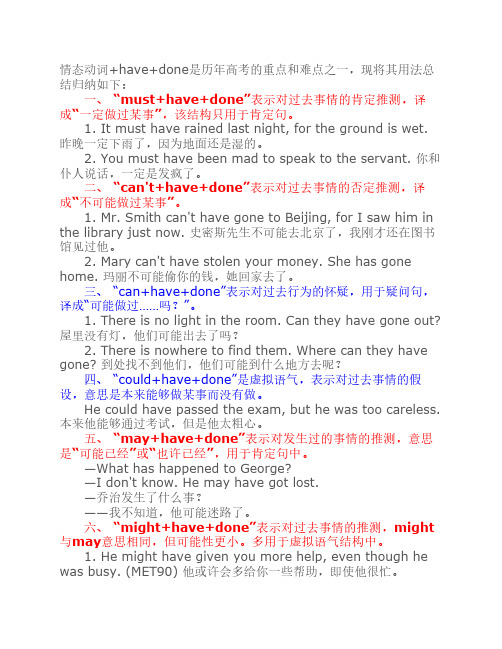
情态动词+have+done是历年高考的重点和难点之一,现将其用法总结归纳如下: 一、 “must+have+done”表示对过去事情的肯定推测,译成“一定做过某事”,该结构只用于肯定句。
1. It must have rained last night, for the ground is wet.昨晚一定下雨了,因为地面还是湿的。
2. You must have been mad to speak to the servant. 你和仆人说话,一定是发疯了。
二、 “can't+have+done”表示对过去事情的否定推测,译成“不可能做过某事”。
1. Mr. Smith can't have gone to Beijing, for I saw him in the library just now. 史密斯先生不可能去北京了,我刚才还在图书馆见过他。
2. Mary can't have stolen your money. She has gone home. 玛丽不可能偷你的钱,她回家去了。
三、 “can+have+done”表示对过去行为的怀疑,用于疑问句,译成“可能做过……吗?”。
1. There is no light in the room. Can they have gone out?屋里没有灯,他们可能出去了吗? 2. There is nowhere to find them. Where can they have gone? 到处找不到他们,他们可能到什么地方去呢? 四、 “could+have+done”是虚拟语气,表示对过去事情的假设,意思是本来能够做某事而没有做。
He could have passed the exam, but he was too careless.本来他能够通过考试,但是他太粗心。
五、 “may+have+done”表示对发生过的事情的推测,意思是“可能已经”或“也许已经”,用于肯定句中。
情态动词havedone的意思及用法

情态动词havedone的意思及用法
情态动词'have done'是由情态动词'have'和过去分词'done'构成的,表示完成的动作或状态。
这种情态动词常用于描述已经完成或需要完成的动作,并且在口语和书面语中都被广泛使用。
在英语中,情态动词'have done'可以用于多种语境,例如:
1. 表示完成的动作
例如:I have done my homework.(我完成了我的家庭作业。
)
2. 表示对过去发生的事情的确认或否认
例如:Have you done your presentation yet?(你的演讲做好了吗?)
3. 表示对未来事件的推断
例如:By next year, we will have done a lot to protect the environment.(到明年,我们会采取很多行动来保护环境。
)
4. 表示建议或命令
例如:You should have done a better job on that project.(你应该把那个项目做得更好。
)
总的来说,情态动词'have done'可以用于许多不同的语境,使其成为英语中非常有用的一种语言工具。
当你使用这个动词时,确保你的语境清晰明确,以使你的意思更加清楚。
巧解“情态动词+have done”
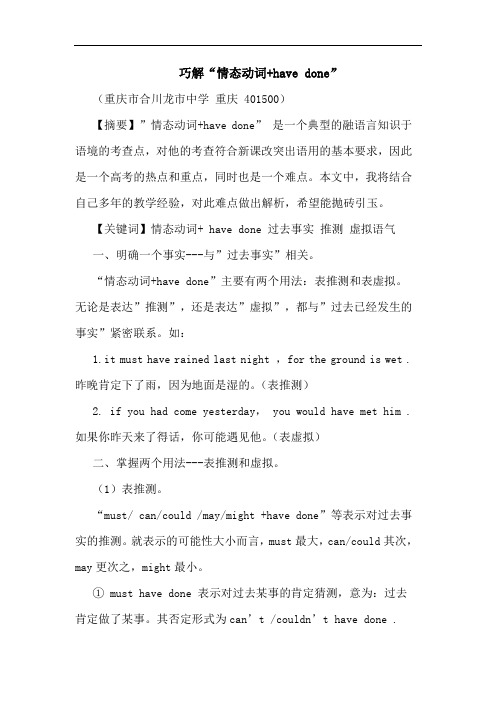
巧解“情态动词+have done”(重庆市合川龙市中学重庆 401500)【摘要】”情态动词+have done”是一个典型的融语言知识于语境的考查点,对他的考查符合新课改突出语用的基本要求,因此是一个高考的热点和重点,同时也是一个难点。
本文中,我将结合自己多年的教学经验,对此难点做出解析,希望能抛砖引玉。
【关键词】情态动词+ have done 过去事实推测虚拟语气一、明确一个事实---与”过去事实”相关。
“情态动词+have done”主要有两个用法:表推测和表虚拟。
无论是表达”推测”,还是表达”虚拟”,都与”过去已经发生的事实”紧密联系。
如:1.it must have rained last night ,for the ground is wet . 昨晚肯定下了雨,因为地面是湿的。
(表推测)2. if you had come yesterday, you would have met him .如果你昨天来了得话,你可能遇见他。
(表虚拟)二、掌握两个用法---表推测和虚拟。
(1)表推测。
“must/ can/could /may/might +have done”等表示对过去事实的推测。
就表示的可能性大小而言,must最大,can/could其次,may更次之,might最小。
① must have done 表示对过去某事的肯定猜测,意为:过去肯定做了某事。
其否定形式为can’t /couldn’t have done .例句:1.the lights were out .they must have been asleep .2. i think that he couldn’t/can’t have gone abroad. i saw him just now.【真题再现】-she looks very happy. she ______ have passed the exam.-i guess so. it’s not difficult after all. (2007 江苏)a. shouldb. couldc. mustd. might【解析】此题考察情态动词表推测的用法。
2020年高考英语专题复习:情态动词+have done和动词的-ing形式作状语
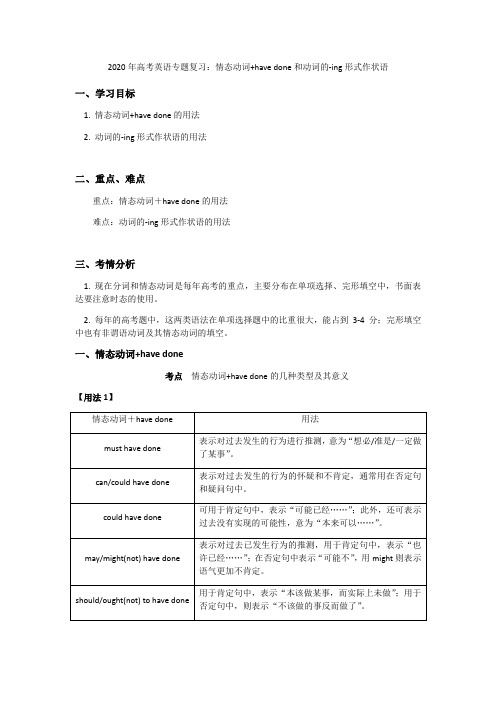
2020年高考英语专题复习:情态动词+have done和动词的-ing形式作状语一、学习目标1. 情态动词+have done的用法2.动词的-ing形式作状语的用法二、重点、难点重点:情态动词+have done的用法难点:动词的-ing形式作状语的用法三、考情分析1. 现在分词和情态动词是每年高考的重点,主要分布在单项选择、完形填空中,书面表达要注意时态的使用。
2. 每年的高考题中,这两类语法在单项选择题中的比重很大,能占到3-4分;完形填空中也有非谓语动词及其情态动词的填空。
一、情态动词+have done考点情态动词+have done的几种类型及其意义【用法1】【例句】It must have rained last night , for the ground is still wet.昨晚肯定下雨了,地面还是湿的。
They should have received the package. We had it delivered yesterday morning.我们昨天早上发出的包裹。
他们应该已经收到了。
I can’t find my purse now. I might have left it in the taxi.我的钱包找不到了,我可能把它忘在出租车里了。
You couldn’t have known about him ten years ago, when he was still unknown.十年前你不可能认识他,那时他还不出名。
Oh,Mom!You needn’t have prepared so much food. Dad and Diana will not come back for supper.妈妈!你不必做这么多饭。
爸爸和戴安娜不回家吃晚饭了。
【考题链接】1. I didn’t see her in the meeting room this morning. She ____________ have spoken at the meeting.A. mustn’tB. shouldn’tC. needn’tD. couldn’t答案:D思路分析:句意:“我今天早上在会议室没有看到她。
情态动词+have+done的用法 高一
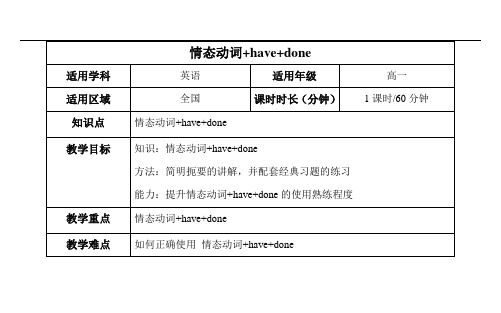
教学过程一、课堂导入先给学生一些比较简单的单选题或其他题型,让学生们自己思考,给出解答,让学生们先形成一种讨论的气氛,养成独立思考的习惯。
二、复习预习讲解上节课布置的作业与练习,以达到复习上节课知识点的目的;三、知识讲解知识点1:情态动词+have+done1【考查点】“must+have+done”表示对过去事情的肯定推测,译成“一定做过某事”,该结构只用于肯定句。
1. It must have rained last night, for the ground is wet.昨晚一定下雨了,因为地面还是湿的。
2. You must have been mad to speak to the servant.你和仆人说话,一定是发疯了。
2【考查点】“can't+have+done”表示对过去事情的否定推测,译成“不可能做过某事”。
1. Mr. Smith can't have gone to Beijing, for I saw him in the library just now.史密斯先生不可能去北京了,我刚才还在图书馆见过他。
2. Mary can't have stolen your money. She has gone home.玛丽不可能偷你的钱,她回家去了。
3【考查点】“can+have+done”表示对过去行为的怀疑,用于疑问句,译成“可能做过……吗?”。
1. There is no light in the room. Can they have gone out?屋里没有灯,他们可能出去了吗?2. There is nowhere to find them. Where can they have gone?到处找不到他们,他们可能到什么地方去呢?4“【考查点】could+have+done”是虚拟语气,表示对过去事情的假设,意思是本来能够做某事而没有做。
高中英语新人教版精品教案《情态动词+have done》
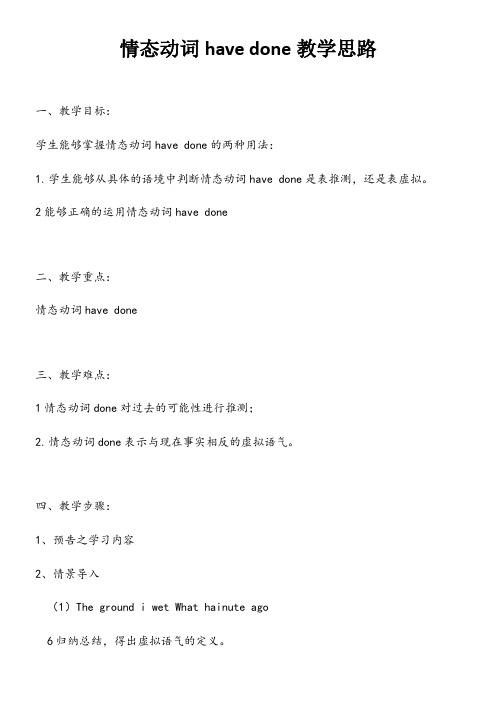
情态动词have done教学思路
一、教学目标:
学生能够掌握情态动词have done的两种用法:
1.学生能够从具体的语境中判断情态动词have done是表推测,还是表虚拟。
2能够正确的运用情态动词have done
二、教学重点:
情态动词have done
三、教学难点:
1情态动词done对过去的可能性进行推测;
2.情态动词done表示与现在事实相反的虚拟语气。
四、教学步骤:
1、预告之学习内容
2、情景导入
(1)The ground i wet What hainute ago
6归纳总结,得出虚拟语气的定义。
7用表格对比学习情态动词have done表猜测和表虚拟的情况8介绍判断情态动词have done是表猜测还是表虚拟的情况。
9讲解练习题巩固
10听情态动词之歌再一次巩固情态动词。
- 1、下载文档前请自行甄别文档内容的完整性,平台不提供额外的编辑、内容补充、找答案等附加服务。
- 2、"仅部分预览"的文档,不可在线预览部分如存在完整性等问题,可反馈申请退款(可完整预览的文档不适用该条件!)。
- 3、如文档侵犯您的权益,请联系客服反馈,我们会尽快为您处理(人工客服工作时间:9:00-18:30)。
精心整理
情态动词+have+done
情态动词+have+done在高考中所占分值为2分左右,常以单选或语篇填空、改错题的
方式出现。
其用法总结归纳如下:
一、“must+have+done”表示对过去事情的肯定推测,译成“一定做过某事”,该
结构只用于肯定句。
1.Itmusthaverainedlastnight,forthegroundiswet.昨晚一定下雨了,因为地面还是
湿的。
吗?”
吗?
已经”
—
—
—
多给你一些帮助,即使他很忙。
2.Shemighthaveachievedgreaterprogress,ifyouhadgivenhermorechances.如
果你多给她点机会,她可能已经取得更大的成绩。
七、“would+have+done”虚拟语气,表示对过去事情的假设,意思是“本来会做”。
1.Iwouldhavetoldyouallabouttheboy'sstory,butyoudidn'taskme.我本来会告诉
你这个小男孩的故事,但是你没有问我。
2.Withoutyourhelp,Iwouldn'thaveachievedsomuch.没有你的帮助,我是不会取
得如此大的成绩。
八、“should+have+done”意思是“本来应该做某事,而实际没做。
”“shouldn'
t+have+done”表示本来不应该做某事,而实际做了。
含有指责对方或自责的含意。
1.Tom,youaretoolazy.Theworkshouldhavebeenfinishedyesterday.汤姆,你太
懒惰了,这项工作本来应该昨天就做完的。
2.Look,Tomiscrying.Ishouldn'thavebeensoharshonhim.看,汤姆哭了,我本来
不应该对他如此严厉。
九、“oughtto+have+done”表示过去应该做而实际并没有做,译成“理应做……”,
往往表示遗憾。
与“should+have+done”用法基本一样。
IoughttohavegonehomelastSunday.我理应上星期日回家。
Yououghtnottohavegivenhimmorehelp.你不应该帮助他那么多。
十、“need+have+done”表示本来需要做某事而没有做。
“needn't+have+done”
则表示“本来不需要做某事而做了”。
Ineedn'thaveboughtsomuchwine—onlyfivepeoplecame.我本来没有必要买这么
表示过去没有必要做某事,但实际上做了某事。
Asyouworkedlateyesterday,you_________havecomethismorning.?????
(06’陕西卷)
A.mayn’t?????????
B.can’t????????
C.mustn’t???????
D.needn’t
[解析]Heneedn'thavecome,表示“他本没有必要来(实际却来了)”,根据句意,答案应选[D]。
[注意]Hedidn'tneedtocomeyesterday,意为“他昨天没有必要来(实际也没来)”。
3.musthave+过去分词
用于肯定句,表示“过去一定做过某事”,表示一种很有把握的推测。
[注意]对过去发生情况的否定推测常用can’t/couldn’thave+过去分词。
Ihavelostoneofmygloves.I________itsomewhere.???????(05’北京春季)
A.mustdrop?????????????
B.musthavedropped
疑问句表示“可能/也许已做了某事吗?”。
---IstayedatahotelwhileinNewYork.
---Oh,didyou?You____withBarbara.????????????????????(NMET’9 8)
A.couldhavestayed?????
B.couldstay
C.wouldstay???????????
D.musthavestayed???????????????Key:[A]
巩固性练习:从A、B、C、D中选择最佳答案。
1.---Youdidn’twaitforMr.Smithlastnight,didyou?
---No,butwe______.Hedidn’treturnhomeatall.
A.couldn’thavewaited????????
B.needn’thave
C.didn’tneedto??????????????
D.shouldwait
2.Harry______havewonthePhysicscompetitioneasilyyesterday,butheg aveup.
A.could??????????????????????????
B.would????????????????????????
C.must???????????????????
D.need
8.Ididn’tseeherinthemeetingroomthismorning.She??????atthemeeting.
???A.mustn’thavespoken???B.mightn’thavespoken
???C.can’thavespoken??????D.shouldn’thavespoken
9.---Hi,isthatPeterBrown?
---Sorry.You______thewrongnumber.
A.mustdial??????????????????????????
B.musthavedialed?????
C.should dial?????????????????????????
D.shouldhavedialed
10.Iwasonthehighwaywhenthiscarwentpastfollowedbyapolicecar.They ______atleast150kilometersanhour.
A.shouldhavebeendoing????????????
B.musthavebeendoing
C.couldhavedone??????????????????
D.wouldhavedone。
